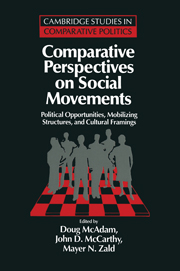 Comparative Perspectives on Social Movements
Comparative Perspectives on Social Movements Published online by Cambridge University Press: 05 June 2012
The relation between social movements and the state is a crucial theme for the understanding of collective action. Long neglected, it acquired a new relevance with the development of the“political process” approach to social movements (Tilly 1978; McAdam 1982). Within this approach, the“political opportunity structure” (POS) (Eisinger 1973; McAdam 1982; Tarrow 1983) is the most inclusive concept we have for dealing with the external, political conditions for protest. In this chapter, while referring to political opportunities for social movements in Italy and the Federal Republic of Germany after World War II, I focus on protest policing as one single variable. I consider protest policing an important barometer of the political opportunities available for social movements, and suggest it has an important effect on action repertoires. Looking at the evolution of policing styles and protest forms of action, I stress the importance of framing processes.
I discuss some advantages of a research on protest policing and summarize the relevant information on the evolution of protest policing in Italy and Germany, comparing the historical evolution of policing styles in the two countries. After this description, I develop a model for the study of causes and consequences of protest policing, and propose some hypotheses on the political opportunities and constraints on protest policing, looking at the more stable political opportunities, the more volatile configuration of power, and police preferences, as well as the potential effects of policing strategies.
To save this book to your Kindle, first ensure no-reply@cambridge.org is added to your Approved Personal Document E-mail List under your Personal Document Settings on the Manage Your Content and Devices page of your Amazon account. Then enter the ‘name’ part of your Kindle email address below. Find out more about saving to your Kindle.
Note you can select to save to either the @free.kindle.com or @kindle.com variations. ‘@free.kindle.com’ emails are free but can only be saved to your device when it is connected to wi-fi. ‘@kindle.com’ emails can be delivered even when you are not connected to wi-fi, but note that service fees apply.
Find out more about the Kindle Personal Document Service.
To save content items to your account, please confirm that you agree to abide by our usage policies. If this is the first time you use this feature, you will be asked to authorise Cambridge Core to connect with your account. Find out more about saving content to Dropbox.
To save content items to your account, please confirm that you agree to abide by our usage policies. If this is the first time you use this feature, you will be asked to authorise Cambridge Core to connect with your account. Find out more about saving content to Google Drive.